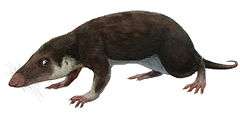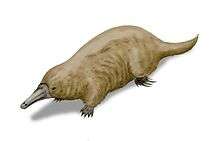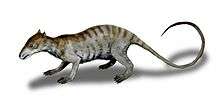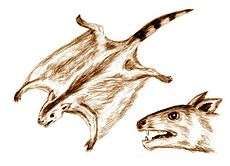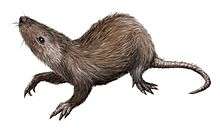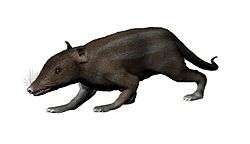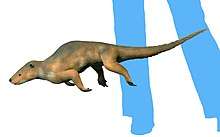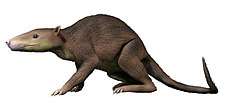Henkelodon
Henkelodon was a small mammal of the Upper Jurassic. It was a relatively early member of the extinct order Multituberculata. Henkelodon was a European herbivore that lived during the "age of the dinosaurs". It lies within the suborder "Plagiaulacida" and family Paulchoffatiidae.
| Henkelodon Temporal range: Late Jurassic | |
|---|---|
| Scientific classification | |
| Kingdom: | Animalia |
| Phylum: | Chordata |
| Class: | Mammalia |
| Order: | †Multituberculata |
| Family: | †Paulchoffatiidae |
| Genus: | †Henkelodon |
| Species: | †H. naias |
| Binomial name | |
| †Henkelodon naias Hahn G., 1977 | |
The genus Henkelodon ("Henkel's tooth") was named by Hahn G. in 1977 based on a single species.
Fossil remains of the species Henkelodon naias were discovered in the Kimmeridgian (Upper Jurassic)-age strata of Guimarota, Portugal. The remains consisted of one upper jaw. According to Kielan-Jaworowska and Hurum, 2001, (p. 413), this genus was named in 1987. However, Hahn and Hahn 2000 (p. 105) supports 1977.
References
- Hahn G (1977), "Neue Schädel-Reste von Multituberculaten (Mamm.) aus dem Malm Portugals". Geologica et Palaeontologica, 11, p. 161-186.
(New skull remains of Multituberculates (Mammalia) from the Malm of Portugal.)
- Hahn G & Hahn R (2000), Multituberculates from the Guimarota mine, p. 97-107 in Martin T & *Krebs B (eds), Guimarota - A Jurassic Ecosystem, Verlag Dr Friedrich Pfeil, München.
- Kielan-Jaworowska Z & Hurum JH (2001), "Phylogeny and Systematics of multituberculate mammals". Paleontology 44, p. 389-429.
- author and year information were kindly supplied by Vince Ward.
- Much of this information has been derived from Multituberculata Cope, 1884.
